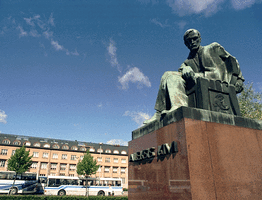| |  |
 |
 |
| artist |
Wäinö Aaltonen (1894 - 1966)
|
|
|
 |
| sculpture |
Aleksis Kiven muistopatsas/ Aleksis Kivi Memorial |
|
|
 |
|
map | Railway Square, Kluuvi |
| |
 |
| |
 |
|
|
|
Aleksis Kivi (1834-1872) is Finland's national author. Wäinö Aaltonen's bronze memorial to him was unveiled on October 10, 1939. The unveiling was preceded by a two-stage competition in 1928-30, the first of which was won by Carl Wilhelms and the second by Aukusti Veuro. However, the memorial was finally commissioned from Wäinö Aaltonen. In 1932, the memorial committee commissioned a plaster draft which was finished in 1934 and cast in bronze in 1939.
The memorial shows a melancholic and contemplative, even introverted Aleksis Kivi. It represents a composed, realistic Classicism, the established trend in Finnish art in the 1920s and 1930s, partly defined by the works of Aaltonen himself. Aaltonen borrowed Aleksis Kivi's features from a portrait A. E. Forsell made of the dead author. Aaltonen had already worked on the features while preparing his entry in a competition for an Aleksis Kivi memorial arranged in Tampere in 1926. Aaltonen modelled Kivi's sitting figure on a painting of a sitting woman the sculptor had made earlier in 1926.
The author is sitting in a chair under which there are three reliefs inspired by Kivi's literary works "Sydämeni laulu", "Keinu" and "Seitsemän veljestä pakenee Impivaarasta" ("My Heart Sings", "Swing" and "The Seven Brothers flee Impivaara").
©
Visual Artists Association
© Helsinki City Artmuseum
WWW-production: Lasipalatsin Mediakeskus Oy,
Flammable Solutions Oy 2001
|
|
|
|

